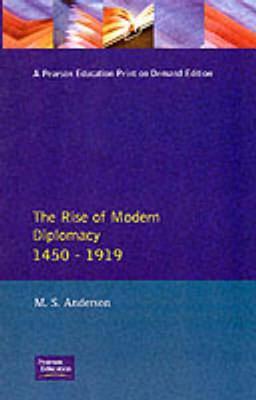

 |

|

The average rating for The rise of modern diplomacy, 1450-1919 based on 2 reviews is 4 stars.
Review # 1 was written on 2018-09-20 00:00:00 Anna Rudzinska Anna RudzinskaA nice overview of 450 years of diplomacy in Europe. Anderson argues that core aspects of 1919's diplomacy can be found in the world of the Italian renaissance. What changed over the years were trends, e.g. the slow centralisation of diplomacy, first in the hands of the sovereign and then in large departments. The most interesting chapter was that on the balance of power, which Anderson does not see as a negative but rather as one of the few unifying aspects of early modern Europe. I felt that the book could be improved by including more information about the smaller states, particularly the small German princedoms, and the constraints that they faced. Quotes: 1. “Until well into the eighteenth century diplomats were to remain an important channel for the transmission from one part of Europe to another not merely of a wide variety of luxury goods... but also of fashions, scientific and technical information, skilled workmen and cultural innovations of all sorts.” (15) 2. “The mechanisms of international relations from the age of Richelieu to that of Robespierre thus show a mixture of the old and new, of old methods and assumptions working in and gradually being adapted to, new situations. But the persisting strength of the old and the traditional, the slowness of change, is a dominant theme of the period.” (41) 3. “Between the outbreak of the French revolution and the meeting of the Paris peace conference Europe's diplomatic organisation changed in many ways more radically than in the preceding 300 years. The nineteenth and twentieth centuries saw the continuation of trends already clearly visible- a consolidation of the network of diplomatic links between the European states and a further growth and elaboration of foreign offices. It also saw one very important new development; it’s extension far more than in the past to bind Europe to other continents.” (103) 4. “The dream of secure and lasting world peace, of a new age in international relations, indeed of the end of international relations in their traditional form, had shown remarkable durability. The relatively sparse and often completely visionary schemes of earlier generations had become from the mid-nineteenth century onwards much more numerous. They had also begun, in their growing reliance on international law and arbitration and even in their increasing exploration of some of the possibilities of supranational government, often to be significantly more in touch with the real world.” (289) 5. “There is not the slightest reason to suppose that if no such formalised and permanent system of interstate contacts had developed the history of Europe would have been more peaceful. On the contrary, the growth of a generally accepted body of diplomatic practice and tradition and it’s gradual extension to cover the whole of Europe clearly had a stabilising and unifying effect.” The balance of power “was in its way an expression, and an important one, of European unity.” (292) |
Review # 2 was written on 2012-06-15 00:00:00 Suzanne Crabbe Suzanne CrabbeGreat analysis! It mixes History, Sociology and theory of International Relations to help you understand the concept of "international society" and how it was applied to all known international systems. The analysis of the European System, in particular, is amazing. |
CAN'T FIND WHAT YOU'RE LOOKING FOR? CLICK HERE!!!